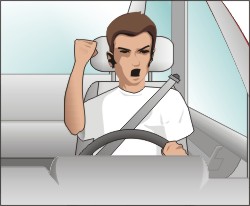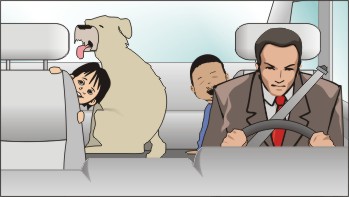Emotion is a word used to identify a strong feeling such as anger, fear and joy. Emotions influence the way you think and act. When emotions affect your thoughts and actions, they can change the way you normally assess risk and make driving decisions.

Strong emotions can interfere with your ability to think and reason. When strong emotions affect you, your ability to make wise decisions is reduced and your chances of making a mistake increases. This may be a reason for road rage. The effect that an emotion has on your ability to drive depends upon the strength of the emotion and effort that you make to resist its effects. Emotions can affect the way you judge the risks involved in a driving situation. A strong emotion can cause you to fix your attention on one event which could cause you to miss another important event in another driving situation. One emotion could lead to another which could result in you experiencing several strong emotions in a short period of time.
Strong emotions can also cause changes in your bodily functions. Your body prepares itself for stressful events by making your heart pump faster and your palms may become sweaty. You can expect some emotional stress in your everyday driving.
If you are angry or excited, give yourself time to cool off. If necessary take a short walk, but stay off the road until you have calmed down.
If you are worried, depressed or upset about something, try to keep your mind on your driving. Try to find something to listen to on the radio.
Emotions influence the way you think and act. When emotions affect your thoughts and actions, they can change the way you normally assess risk and make driving decisions.
When strong emotions affect you, your ability to make wise decisions is reduced. Your chances of making a mistake increase.
If you are impatient, give yourself extra time for your driving trip. Leave a few minutes early. If you have plenty of time, you tend not to speed or do other things that can get you a traffic ticket or cause a crash.
Don't be impatient if a train crosses in front of you. Wait instead. Driving around lowered gates or trying to beat the train can be fatal. Don't become impatient with a slower driver ahead of you.
DEALING WITH DISTRACTIONS
There are many distracting factors that compete for the driver's attention. It is important that good habits be developed so there can be safe movement through a traffic situation. Distraction from the driving task is caused by:

- Thinking of things other than driving.
- Talking on a cell phone.
- Having "distracters" which require the driver's attention in the vehicle.
- Situations outside the vehicle that attract the operator's attention.
- Environmental factors.
- Vehicle factors.
- Route problems in unfamiliar areas
- Seeing one potential collision hazard in the traffic scene while failing to see another.2
No comments:
Post a Comment